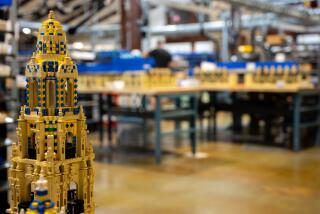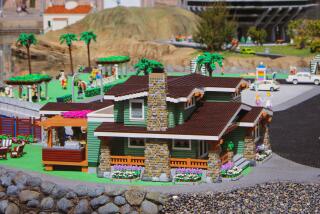Want to become a Lego Master? Ask the experts: It won’t be easy
Whether following the instructions for an extremely detailed model of “Star Wars’” Millennium Falcon or assembling a freeform rainbow pirate ship, all Lego builds start by snapping together two interlocking plastic bricks.
The basic mechanics are simple, but the boundless creative possibilities have made the versatile toy popular among generations of kids. And more than 60 years since the bricks’ debut, Lego has become an entertainment mainstay, spawning movies, video games and theme parks.
Now, a new level of brick-building is in the spotlight thanks to Fox’s competition series “Lego Masters,” which airs Wednesdays.
Hosted by Lego Batman voice actor Will Arnett, the show features 10 two-person teams competing in weekly challenges that whittle the contestants down until one team remains.
It’s a familiar formula for viewers who have followed other creative competition shows: The last team standing wins a trophy and a $100,000 prize. Not so familiar? The title that comes with winning: Lego Master.
“We have three key criteria that we’re really judging the teams on throughout every challenge,” said Amy Corbett, a senior design manager at the Lego Group who has worked on the Lego Friends and Lego Disney lines. Corbett is one of two experts judges on the series, known as “Brickmasters.”
Challenges may emphasize certain criteria — creativity, technical ability and storytelling — over others, but each confronts the contestants with a distinct task.
“For each of the episodes, we’re asking them to do some very specific thing,” said Brickmaster Jamie Berard, who oversees the Creator Expert and Lego Architecture lines at Lego. “So it seems on the surface to be straightforward on the things that we can judge. But in reality it’s actually quite complicated, because there’s so many different ways of solving the challenge.”
The contestants — who range in age from 23 to 65 — include artists, engineering teachers, a game developer and a piano teacher. Their approaches to and experiences with Lego are as varied as their jobs. But they all want the title Lego Master.
“A Lego Master is somebody who can use the Lego system in multiple ways to tell stories, create emotion and amaze people with Lego bricks,” said Sam Hatmaker, a contestant and the L.A.-based artist who designed a viral “Golden Girls”-inspired build.
His teammate, multimedia artist Jessica Ragzy Ewud, agreed: “‘Lego Masters’ is all about taking Lego and taking creativity and pushing it to the absolute limit within the time that we’re given.”
The ability to roll with the punches and being unafraid of failure are traits Flynn De Marco thinks are key for those competing for the Lego Masters title.
“Failure is the way that we learn things and the way that we learn not to do things and also how to improve on things to make us better,” said De Marco, an Oakland-based contestant who teaches Lego engineering to kids. “I think that part of being a Lego Master is not only knowing your limits but being willing to go beyond them.”
De Marco’s teammate and husband, Richard Board, reiterated that flexibility is a key skill for anyone hoping to master the medium and win the Lego Masters title.
“I think to be a true Lego Master, you should be able to build whatever you can dream up in bricks,” said Board. “And you should be able to take your same brick skills and build something you never even thought about before.”
While “Lego Master” is an official title that will be bestowed upon the winners of the show, there are other skilled builders in the greater Lego fandom, as well as other prestigious Lego titles.
Like many fan communities, Lego enthusiasts have their own fandom-specific slang, or fanspeak. Adult members of the fandom are most commonly known as AFOLs, short for Adult Fan of Lego. Some of these adults have returned to the hobby after their “Dark Ages,” a period of time in which a person loses interest in Lego, often while growing up.
And it turns out a Master Builder is not just a plot point from 2014’s “The Lego Movie” — it’s a job.
Lego Master Model Builders are experts who have been hand-picked to work at Legoland Discovery Centers or Legoland theme parks operated by Merlin Entertainments. These master builders are generally selected through a Brick Factor competition that involves impressing a panel of judges through three rounds of timed building challenges.
The Lego Master Model Builder serves as the resident Lego expert, with responsibilities that include designing, building and maintaining models at their location. They can also be tasked with running workshops, interacting with media and participating in events.
Another highly exclusive class of AFOLs recognized by Lego is Lego Certified Professionals.
LCPs are not Lego employees and do not represent the company, but are entrepreneurs Lego has recruited for a business partnership. They are the independent builders and freelance artists endorsed by Lego. There are only 15 LCPs in the world. There is no official training program to become an LCP.
What distinguishes the Lego Masters title from these other prestigious classes is that it’s earned with a partner.
“We don’t have a single winner; you’re winning as a team,” said Berard. “So it’s someone who can actually balance their skills with the skills of their partner and make sure that they’re maximizing their creativity and their efforts to really show off how two people are better than one. It takes both of them in order to win.”
The “Lego Masters” contestants and judges agree that practice is the only way for people to level up their Lego skills.
“If you really, really want to be an expert, you need to build every day,” said De Marco. “Set an hour aside and just put bricks together. It doesn’t matter what you’re making or whether or not you’re going to post it online or if anybody’s even going to see it. Just build and familiarize yourself with the pieces and the medium.”
Said Hatmaker: “You learn every single time you build.”
And because “Lego Masters” is a show with no instruction manuals, it would be beneficial to challenge yourself to make different things with a limited brick selection.
“It doesn’t have to take a tremendous amount of time,” said Berard. “But just having somebody tell you to build something, and then you do it, it’s really liberating.”
And remember, “you don’t need to build alone,” said Corbett. “If someone wants to get even better at building, it’s really good to build together with someone. Whether you’re building two separate models or one build together, chatting to someone about what you’re making and giving each other ideas, that’s when you can really make leaps in your building.
“And it’s fun when you do it with someone.”
More to Read
The complete guide to home viewing
Get Screen Gab for everything about the TV shows and streaming movies everyone’s talking about.
You may occasionally receive promotional content from the Los Angeles Times.







